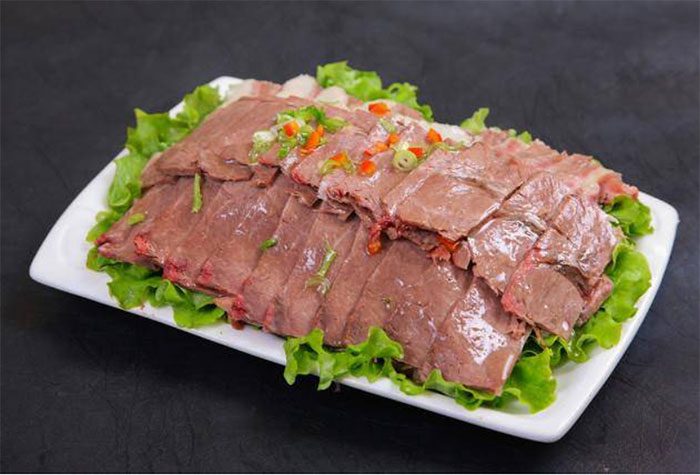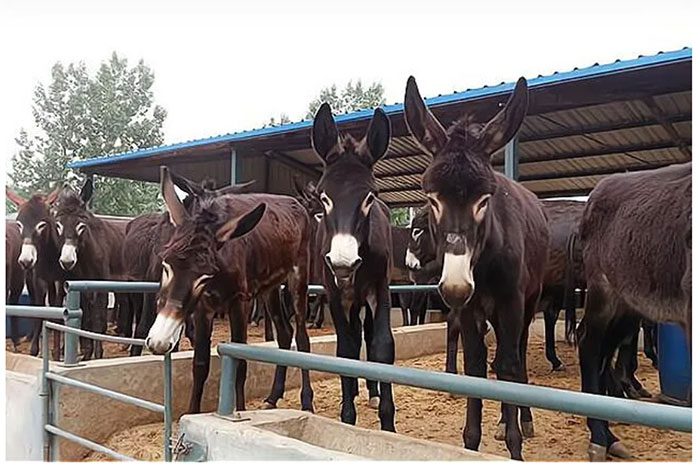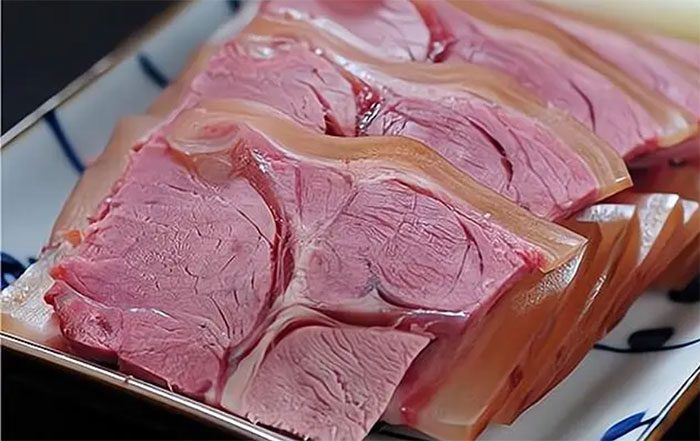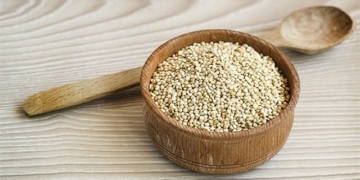What makes this animal so special that its meat is highly praised?
Why is this animal’s meat sold at a high price?
There is a Chinese saying, “Donkey meat on the ground is tastier than dragon meat in the sky,” which implies that donkey meat is exceptionally delicious. In China, donkey meat is considered a delicacy and can be prepared in various dishes. Some restaurants in China serve donkey meat, with the most popular dish being donkey meat dumplings with cabbage and vegetables. In Henan province, donkey meat noodles are a well-known specialty. Even in Beijing, you might have the chance to try a donkey meat burger.

Donkey meat has many beneficial effects on human health. (Image: Sohu).
Not only is it delicious, but donkey meat also offers numerous health benefits. The book Ben Cao Gang Mu describes donkey meat as follows: “Donkey meat alleviates mental distress and irritability. It treats madness when prepared with liquor and other brewing ingredients, curing all types of wind-related ailments.” Donkey meat is believed to nourish blood and energy, making it beneficial for those with insufficient vitality.
In modern medicine, donkey meat provides a large amount of protein and amino acids while being low in fat and cholesterol. It supplies essential calcium, phosphorus, iron, and carbohydrates. Additionally, donkey meat is rich in animal gelatin, making it suitable as a nourishing dish for the elderly, young children, and those recovering from illness.

The price of donkey meat and skin is not cheap, yet many people refuse to raise them for economic purposes. (Image: Sohu).
In China, the meat and skin of donkeys are sold like those of other animals. One kilogram of donkey meat sells for 140 RMB (about 500,000 VND), while donkey skin can be sold for around 50 RMB (about 170,000 VND). Thus, the prices of donkey meat and skin are neither cheap nor expensive. However, in rural areas, people do not raise these animals for meat. Why is that?
Three Reasons Why Many People Do Not Want to Raise Donkeys
According to Chinese farmers, there are three reasons why they do not choose to raise donkeys on a large scale for economic purposes.
Low Demand
According to Sina, despite many praises for donkey meat, the demand for this type of meat is not high. For most people, they prefer pork, beef, or poultry, which have better market prices. Therefore, farmers looking to raise donkeys for business find the market for their products limited.

A whole donkey, including meat and skin, can sell for over 30 million VND. (Image: Sohu)
Currently, donkey meat is mainly sold in high-end restaurants, hotels, and a few other places, but this is not a broad market. Moreover, the limited and uncertain demand does not encourage farmers to invest significantly in donkey farming.
High Breeding Costs
Although the selling price of donkey meat is moderate, the cost of raising them is quite high. The growth cycle of a donkey is long, which increases feed costs and reduces farmers’ profits. A breeding donkey costs about 3,000 to 4,000 RMB (approximately 10 million to over 13 million VND).

Donkey meat is expensive, but the cost of raising these animals is quite high. (Image: Sohu).
The time for a donkey to mature is over a year. Feed costs are around 2,000 RMB (nearly 6.8 million VND), plus vaccination costs of 500 RMB (about 1.7 million VND). Thus, the total investment to raise a mature donkey will cost farmers around 5,000 to 6,000 RMB (from 17 million to over 20 million VND). After deducting all expenses, the profit left is only about 2,000 to 3,000 RMB (approximately 6.8 million to over 10 million VND). Therefore, it is evident that the profit farmers can earn is not substantial, leading them to avoid raising donkeys for meat.
Long Reproductive Cycle
According to Chinese zoologists, the reproductive cycle of donkeys is quite long. A female donkey takes over a year (348 to 377 days) to give birth to a foal. After that, the foals require an additional year and a half to mature. Compared to other animals like chickens or pigs, the reproductive cycle of donkeys is significantly longer.

Donkeys have a long reproductive time, so many farmers do not choose them for meat production. (Image: Sohu)
For farmers, prioritizing animals with shorter reproductive cycles for quicker capital recovery is essential. While raising donkeys can be profitable, farmers must wait a long time before they can recoup their investment, and the profit is minimal. Consequently, many farmers find that raising donkeys does not meet their requirements, making it rare for them to choose this animal for economic purposes.




















































